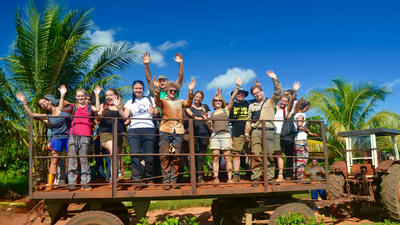
In an increasingly interconnected world, the concept of travel has evolved beyond mere sightseeing and relaxation. Many travelers are now seeking ways to contribute positively to the communities they visit, leading to the rise of volunteer tourism, or "voluntourism." This form of travel combines exploration with meaningful work, allowing travelers to make a difference while experiencing new cultures and environments.
Understanding Volunteer Tourism
Volunteer tourism involves traveling to a destination to participate in activities that benefit local communities and environments. These activities can range from teaching English to children, assisting in conservation projects, building infrastructure, and providing healthcare services. Volunteer tourists dedicate their time and skills to address various social and environmental issues, often in partnership with local organizations or NGOs.
The Appeal of Volunteer Tourism
The appeal of volunteer tourism lies in its potential to create meaningful experiences for travelers while making a positive impact. Here are a few reasons why people choose to engage in volunteer tourism:
-
Personal Fulfillment: Many volunteers find satisfaction in giving back and contributing to a cause they care about. This sense of purpose can lead to personal growth and a deeper connection to the places they visit.
-
Cultural Exchange: Volunteer tourism provides opportunities for cultural exchange and immersion. Travelers live and work alongside locals, learning about their traditions, values, and daily life. This fosters mutual respect and understanding.
-
Skill Development: Participating in volunteer projects can help travelers develop new skills or enhance existing ones. Whether through teaching, building, or conservation work, participants gain practical experiences that may benefit their personal or professional lives.
-
Affordable Travel Options: Many volunteer programs offer affordable accommodation and meals in exchange for service, making it a viable option for budget-conscious travelers. This allows individuals to travel longer or to destinations that may be otherwise out of reach.
The Global Impact of Volunteer Tourism
1. Social Development
Volunteer tourism plays a significant role in contributing to social development. Many projects focus on education, healthcare, and community development. For example, volunteering in rural schools can help bridge educational gaps, providing children with access to quality learning experiences.
Additionally, healthcare volunteers can offer essential services in regions lacking medical professionals. By providing health education, vaccination campaigns, and basic healthcare, volunteer tourists can contribute to improved community health outcomes.
2. Economic Benefits
Volunteer tourism can stimulate local economies. When travelers engage in volunteer programs, they often spend money in the communities they visit, supporting local businesses such as markets, restaurants, and shops. This influx of funds aids in creating jobs and promoting economic sustainability.
Moreover, many volunteer programs are designed to build local capacity. By training locals in various skills, volunteer projects empower communities to become self-sufficient and sustainable long after the volunteers have departed.
3. Environmental Conservation
Environmental volunteer tourism focuses on preserving and protecting natural resources. Volunteers can participate in conservation projects such as wildlife monitoring, habitat restoration, and marine protection. These initiatives not only protect biodiversity but also raise awareness about environmental issues.
For example, volunteers may work on reforestation projects, help maintain national parks, or participate in beach clean-ups. These hands-on experiences foster a greater understanding of environmental challenges and inspire participants to become advocates for sustainable practices.
4. Strengthening Communities
Volunteer tourism often fosters community participation and collaboration. Volunteers work alongside local residents, creating opportunities for dialogue and shared experiences. This can strengthen community bonds and promote social cohesion.
Additionally, many volunteer projects are designed to address specific community needs, allowing locals to have a voice in the development process. By involving community members in project planning and execution, volunteer tourism encourages ownership and fosters lasting change.

Popular Volunteer Tourism Destinations
1. Costa Rica
Costa Rica is a popular destination for volunteer tourism, especially in the areas of environmental conservation and wildlife protection. Volunteer opportunities range from protecting endangered species, such as turtles and monkeys, to participating in reforestation efforts.
Volunteers can also contribute to community development initiatives, such as teaching English in local schools or assisting with sustainable farming projects. The country's commitment to biodiversity and sustainability makes it an attractive location for environmentally focused travelers.
2. Thailand
Thailand offers a variety of volunteer programs that allow travelers to engage with local communities and contribute to social development. Opportunities include teaching English to children, providing support in orphanages, and participating in community health initiatives.
Additionally, Thailand's rich culture and stunning landscapes enhance the overall experience for volunteers. From bustling cities to tranquil beaches, there is much to explore while making a difference.
3. South Africa
South Africa offers volunteer programs focused on wildlife conservation and community development. Volunteers can participate in projects aimed at protecting endangered species, such as rhinos and elephants, as well as assisting in local schools and community centers.
The country's diverse ecosystems and vibrant culture provide a stunning backdrop for volunteer tourism, making it a unique destination for socially conscious travelers.
4. India
India is home to numerous volunteer opportunities, especially in the areas of education, healthcare, and women's empowerment. Travelers can volunteer in underserved schools, healthcare clinics, and women's shelters, providing much-needed support and services.
Volunteering in India also offers a chance to immerse oneself in a rich cultural tapestry, with opportunities to explore historical sites, partake in local festivals, and experience the hospitality of Indian communities.
Tips for Successful Volunteer Tourism
1. Research Volunteer Opportunities
Before committing to a volunteer program, thoroughly research the organization and the project. Ensure the organization's mission aligns with your values and that it operates ethically. Look for feedback from past volunteers to gauge their experiences.
2. Understand Local Needs
Take the time to learn about the local community and its needs. Engaging with community members beforehand can provide valuable insights and ensure your efforts are impactful. Understanding the local culture, customs, and values can also foster respectful interactions.
3. Be Realistic About Impact
While volunteering can make a difference, it is important to have realistic expectations. Lasting change often requires sustained effort and collaboration beyond the involvement of individual volunteers. Focus on making a positive impact, no matter how small.
4. Keep an Open Mind
Approach your volunteer experience with an open mind and a willingness to learn. Being adaptable and respectful of local customs will lead to more meaningful interactions and a deeper understanding of the culture.
5. Reflect on Your Experience
After returning home, take time to reflect on your volunteer experience. Consider the lessons learned, the connections made, and how you can continue to support the causes you care about. Sharing your experience through social media or a blog can inspire others to engage in volunteer tourism.
The Future of Volunteer Tourism
As awareness of social and environmental issues continues to grow, volunteer tourism is expected to evolve. More travelers are seeking opportunities to contribute positively, leading to the development of innovative programs that address pressing global challenges.
Organizations are increasingly focused on creating sustainable volunteer programs that prioritize long-term community engagement and impact. This shift ensures that volunteer tourism does not just provide temporary assistance, but rather fosters lasting change.
Additionally, technology is playing a significant role in the future of volunteer tourism. Online platforms are making it easier for travelers to connect with volunteer opportunities around the world. These platforms can help potential volunteers find projects that align with their skills and interests.
Conclusion
Volunteer tourism is making a significant difference globally, empowering travelers to contribute to community development, environmental conservation, and social change. By combining travel with meaningful work, volunteers foster cultural exchange and create connections that transcend borders.
As we move forward in an increasingly globalized world, the impact of volunteer tourism will continue to grow. By understanding the importance of responsible volunteering and embracing the spirit of giving back, travelers can leave a positive mark on the world while enriching their own experiences.
Whether you are looking to immerse yourself in a new culture, develop valuable skills, or support meaningful projects, volunteer tourism offers a unique opportunity to make a difference while exploring the beauty of our planet. Embrace the journey, and become part of a global initiative that seeks to create a better world for everyone.



